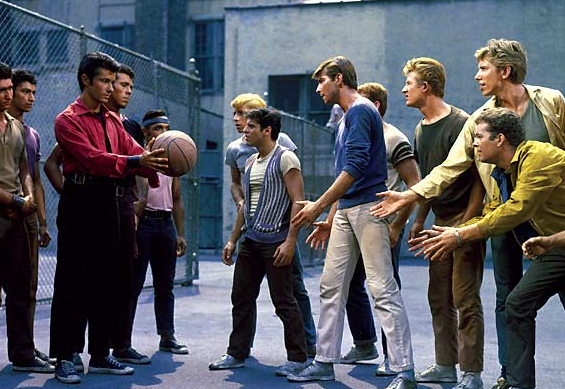As it was the 50th anniversary of West Side Story at the end of 2011 I thought I’d share my memories of this great show. Performing with the LSO at the Barbican Centre London was one of my first experiences of working with a professional national UK orchestra. I can’t remember exactly how old I was but I’d have been in my early 20’s. A good drummer friend of mine who did a lot of work with them passed on my details to their fixer so I got the call – no audition, no references requested, just word of mouth. That’s how it’s often done (once in a blue moon a disaster happens). Coming from a rhythm section background I’d not had nearly as much experience working with a conductor as say a violin or cello player would have, so whilst I had worked with conductors before they we’re mainly from the west end, and these type of MDs tend to have a very different style to the classically trained orchestral conductors.
 As I’d heard it was a difficult score to play I contacted the LSO’s librarian a few days before rehearsal began so I could have a look through the music. I’m very glad I did because the guitar parts were really quite tricky. There are lots of different intricate rhythms coupled with some very exposed high fiddley jazz guitar lines written in unison with vibes which are very exposed. I think I spent the next couple of days looking through the parts arriving at the Barbican for the morning of the rehearsal still wishing I had a bit more time to spend on them.
As I’d heard it was a difficult score to play I contacted the LSO’s librarian a few days before rehearsal began so I could have a look through the music. I’m very glad I did because the guitar parts were really quite tricky. There are lots of different intricate rhythms coupled with some very exposed high fiddley jazz guitar lines written in unison with vibes which are very exposed. I think I spent the next couple of days looking through the parts arriving at the Barbican for the morning of the rehearsal still wishing I had a bit more time to spend on them.
I set my gear up on the Barbican stage, said hello to a few people I knew and in no time at all the American conductor appeared. He was a very young chap, looked mid twenties, not that much older than myself which surprised me. I later found out that he was one of Leonard Bernstein prodigies and watching him interact with the violin section he seemed like a nice chap. I’d worked with American musical directors and conductors before and some of them can be a bit brash. (I saw things get very tense on a later recording session I did with the LSO where the American conductor said to the strings after a difficult morning of recording that he wanted them to “Swell” a certain passage, not “Smell’ and it all went down hill after that. Hell hath no fury like a string section scorn!)
So the start of the rehearsal goes like this. Conductor stands on his podium, orchestra stops tuning, eye contact made between conductor and orchestra, up beat then down beat, guitar plays then the orchestra. What I know now but didn’t back then is that symphony orchestras play very behind the beat. It was a horrible moment for me, it seemed like everybody on stage knew something that I didn’t. I very quickly worked out where the down beat was and by the end of the first rehearsal was pretty much ok. During the break and before the afternoon rehearsal whilst I was fiddling about with my equipment on stage the conductor walked towards me. My heart sank as I thought he was going to tick me off or even send me home (I have seen musicians sent home for various reasons before). Instead he smiled at me, introduced himself and shook my hand, made reference to the beginning of the rehearsal and that we weren’t all together and that he hadn’t been clear enough with his down beat. He demonstrated to me the quality of a great musical leader by shouldering the blame (even though we both new it was my in-experience) so as to not destroy my confidence and improve the overall sound of the orchestra. I don’t know what became of him but I imagine he went on and is still doing great things. For me it was a a lesson in how to get the best out of people. Musicians are creative artists and a negative comment or even a look can destroyed their ability to perform, sometimes with lasting effect.
The concerts went well and Leonard Bernstein himself attended, I heard later he was very pleased with the orchestras performance.
The other nice thing for me about this early experience was that it was the first time my grandmothers had seen me perform in a professional capacity. Prior to this I think they thought me wanting to play the guitar for a living was just a phase and that I would grow out of it and get a ‘Proper Job’.
